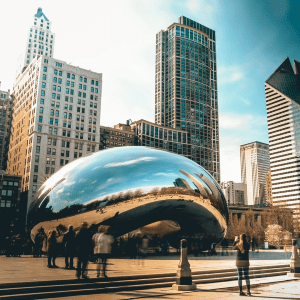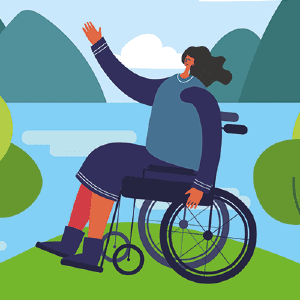 STR’s Tourism Consumer Insights team has been keeping a close eye on traveler and tourism trends as the industry moves through the most optimistic point of the pandemic.
STR’s Tourism Consumer Insights team has been keeping a close eye on traveler and tourism trends as the industry moves through the most optimistic point of the pandemic.
The twists and turns of the COVID-19 pandemic have contributed to seismic changes in tourism. These include the cessation of international travel for some countries, and, as discussed in previous “Tourism After Lockdown” pieces, shifting preferences when it comes to choosing accommodation and places to visit.
In February 2021, STR conducted quantitative research via its Traveler Panel to examine attitudes toward travel in this “new COVID world”.
We evaluate the barriers influencing travelers’ decisions not to book or undertake an overnight trip.
The obvious factor—COVID-19
Our research gauged travel activity during the first few months of the year. Although a sizeable number of respondents had undertaken or booked a trip, the majority had not traveled.
Unsurprisingly, among these respondents, COVID-19 was flagged as a major reason for not booking or undertaking travel. While 4% stated that COVID-19 hadn’t influenced their decision to not book or take an overnight trip, the remainder (96%) declared that their travel bookings were affected by the pandemic.
So, why has COVID-19 influenced travelers’ decisions not to book or undertake travel?
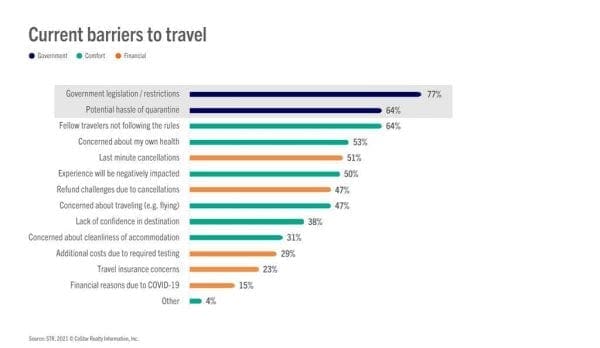
Government legislation and restrictions along with the potential hassle of quarantine were two key barriers to travel for respondents.
The travel industry has little control over these barriers. However, as vaccine programs continue to expand globally, easing travel restrictions and loosening quarantine requirements are likely to follow, which bodes well for the industry.
Areas in which the travel industry can have an impact are in the next set of barriers, which are segmented into comfort and financial barriers.
Nearly two-thirds (64%) of respondents flagged fellow travelers not following the rules as a reason for not booking or undertaking travel. Personal health concerns were also a notable barrier mentioned by over half.
Travelers from North America and the U.K. viewed comfort and wellbeing as a greater barrier, while Europeans seemed less concerned, which is likely linked to their younger, more carefree, age profile.
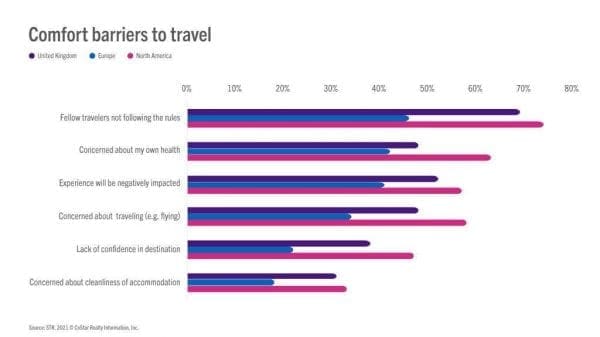
While one size doesn’t fit all, effective COVID-safe measures and clear communications by travel brands can do much to reassure consumers and mitigate the impact of these comfort barriers. However, one caution is that this reassurance must be communicated delicately so as not to alarm travelers.
There is less variation across regions when looking at financial barriers. Last-minute cancellations and refund challenges due to cancellations were stated as the main financial barriers to travel for respondents across all regions.
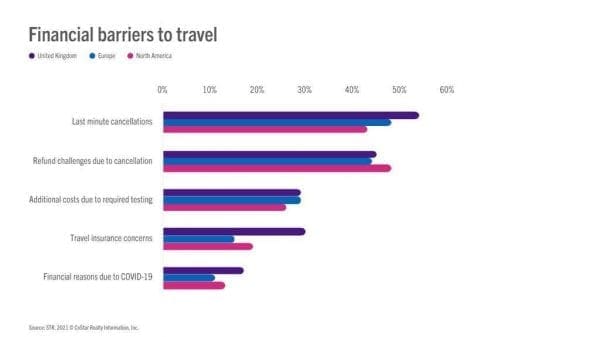
While one size doesn’t fit all, effective COVID-safe measures and clear communications by travel brands can do much to reassure consumers and mitigate the impact of these comfort barriers. However, one caution is that this reassurance must be communicated delicately so as not to alarm travelers.
There is less variation across regions when looking at financial barriers. Last-minute cancellations and refund challenges due to cancellations were stated as the main financial barriers to travel for respondents across all regions.





